#consent of the governed
Text
Two notions of liberty revisited—or how to disentangle Liberty and Slavery
The modern liberal concept of liberty has roots in Roman law and the Roman understanding of the master and the slave. We need to unpick that heritage to imagine a better basis for our political aspirations.
David Graeber
May 19, 2013
Our idea of human freedom, with its origins in Roman law, is permeated through and through with the institution of slavery. But its links to slavery twisted the meaning of “freedom” from an empowering notion of what it is to live with dignity in a society of equals to one of mastery and control. Understanding the history of the concept should help us to regain the first and fight the second of those notions.
The meaning of the Roman word libertas changed dramatically over time. To be “free” meant, first and foremost, not to be a slave. Since slavery means above all else the annihilation of social ties and the ability to form them, freedom meant the capacity to make and maintain moral commitments to others. The English word “free,” for instance, is derived from a German root meaning “friend,” since to be free meant to be able to make friends, to keep promises, to live within a community of equals. Freed slaves in Rome became citizens—and this makes complete sense because to be free, by definition, meant to be anchored in a civic community, with all the rights and responsibilities that this entailed.
By the second century AD, however, this had begun to change. The jurists gradually redefined libertas until it became almost indistinguishable from the power of the master. It was the right to do absolutely anything, with the exception, again, of all those things one could not do. In the Digest, the basic text of Roman law, the definitions of freedom and slavery appear back to back:
Freedom is the natural faculty to do whatever one wishes that is not prevented by force or law. Slavery is an institution according to the law of nations whereby one person becomes private property (dominium) of another, contrary to nature.
Medieval commentators immediately noticed the problem here. But wouldn’t this mean that everyone is free? After all, even slaves are free to do absolutely anything they’re actually permitted to do. To say a slave is free (except insofar as he isn’t) is a bit like saying the earth is square (except insofar as it is round), or that the sun is blue (except insofar as it is yellow), or, again, that we have an absolute right to do anything we wish with our chainsaw (except those things that we can’t).
In fact, the definition introduces all sorts of complications. If freedom is natural, then surely slavery is unnatural, but if freedom and slavery are just matters of degree, then, logically, would not all restrictions on freedom be to some degree unnatural? Would not that imply that society, social rules, in fact even property rights, are unnatural as well? This is precisely what many Roman jurists did conclude—that is, when they did venture to comment on such abstract matters, which was only rarely. Originally, human beings lived in a state of nature where all things were held in common; it was war that first divided up the world, and the resultant “law of nations,” the common usages of mankind that regulate such matters as conquest, slavery, treaties, and borders, that was first responsible for inequalities of property as well.
This in turn meant that there was no intrinsic difference between private property and political power—at least, insofar as that power was based in violence. Dominium, a word derived from dominus, meaning “master,” or “slave-owner,” is the term in Roman law that means absolute private property. It is the sort of property-right that today has been theorised as the model case of a “negative freedom”—that which you can do with no interference from anyone else.
As time went on, Roman emperors also began claiming something like dominium, insisting that within their dominions, they had absolute freedom—in fact, that they were not bound by laws. At the same time, Roman society shifted from a republic of slave-holders to arrangements that increasingly resembled later feudal Europe, with magnates on their great estates surrounded by dependent peasants, debt servants, and an endless variety of slaves—with whom they could largely do as they pleased. The barbarian invasions that overthrew the empire merely formalized the situation, largely eliminating chattel slavery, but at the same time introducing the notion that the noble classes were descendants of the Germanic conquerors, and that the common people were inherently subservient.
Still, even in this new Medieval world, the old Roman concept of freedom remained. Freedom was simply power. When Medieval political theorists spoke of “liberty,” they were normally referring to a lord’s right to do whatever he wanted within his own domains—his dominium. This was, again, usually assumed to be not something originally established by agreement, but a mere fact of conquest: one famous English legend holds that when, around 1290, King Edward I asked his lords to produce documents to demonstrate by what right they held their franchises (or “liberties”), the Earl Warenne presented the king only with his rusty is sword. Like Roman dominium, it was less a right than a power, and a power exercised first and foremost over people—which is why in the Middle Ages it was common to speak of the “liberty of the gallows,” meaning a lord’s right to maintain his own private place of execution.
By the time Roman law began to be recovered and modernized in the twelfth century, the term dominium posed a particular problem, since, in ordinary church Latin of the time, it had come to be used equally for “lordship” and “private property.” Medieval jurists spent a great deal of time and argument establishing whether there was indeed a difference between the two. It was a particularly thorny problem because, if property rights really were, as the Digest insisted, a form of absolute power, it was very difficult to see how anyone could have it but a king—or even, for certain jurists, God.
This genealogy of liberty allows us to understand precisely how Liberals like Adam Smith were able to imagine the world the way they did. This is a tradition that assumes that liberty is essentially the right to do what one likes with one’s own property. In fact, not only does it make property a right, it treats rights themselves as a form of property. In a way, this is the greatest paradox of all. We are so used to the idea of “having” rights—that rights are something one can possess—that we rarely think about what this might actually mean. In fact (as Medieval jurists were well aware), one man’s right is simply another’s obligation. My right to free speech is others’ obligation not to punish me for speaking; my right to a trial by a jury of my peers is the responsibility of the government to maintain a system of jury duty. The problem is just the same as it was with property rights: when we are talking about obligations owed by everyone in the entire world, it’s difficult to think about it that way. It’s much easier to speak of “having” rights and freedoms. Still, if freedom is basically our right to own things, or to treat things as if we own them, then what would it mean to “own” a freedom—wouldn’t it have to mean that our right to own property is itself a form of property? That does seem unnecessarily convoluted. What possible reason would one have to want to define it this way?
Historically, there is a simple—if somewhat disturbing—answer to this. Those who have argued that we are the natural owners of our rights and liberties have been mainly interested in asserting that we should be free to give them away, or even to sell them.
Modern ideas of rights and liberties are derived from what came to be known as “natural rights theory”—from the time when Jean Gerson, Rector of the University of Paris, began to lay them out around 1400, building on Roman law concepts. As Richard Tuck, the premier historian of such ideas, has long noted, it is one of the great ironies of history that this was always a body of theory embraced not by the progressives of that time, but by conservatives. “‘For a Gersonian, liberty was property and could be exchanged in the same Way and in the same terms as any other property’—sold, swapped, loaned, or otherwise voluntarily surrendered.” It followed that there could be nothing intrinsically wrong with, say, debt peonage, or even slavery. And this is exactly what natural-rights theorists came to assert. In fact, over the next centuries, these ideas came to be developed above all in Antwerp and Lisbon, cities at the very center of the emerging slave trade. After all, they argued, we don’t really know what’s going on in the lands behind places like Calabar, from which so many men and women were being enslaved and shipped to the Americas, but there is no intrinsic reason to assume that the vast majority of the human cargo conveyed to European ships had not sold themselves, or been disposed of by their legal guardians, or lost their liberty in some other perfectly legitimate fashion. No doubt some had not, but abuses will exist in any system. The important thing was that there was nothing inherently unnatural or illegitimate about the idea that freedom could be sold.
Before long, similar arguments came to be employed to justify the absolute power of the state. Thomas Hobbes was the first to really develop this argument in the seventeenth century, but it soon became commonplace. Government was essentially a contract, a kind of business arrangement, whereby citizens had voluntarily given up some of their natural liberties to the sovereign. Finally, similar ideas have become the basis of that most basic, dominant institution of our present economic life: wage labor, which is, effectively, the renting of our freedom in the same way that slavery can be conceived as its sale.
It’s not only our freedoms that we own; the same logic has come to be applied even to our own bodies, which are treated, in such formulations, as really no different than houses, cars, or furniture. We own ourselves, therefore outsiders have no right to trespass on us.
This might seem an innocuous, even a positive notion, but it looks rather different when we take into consideration the Roman tradition of property on which it is based. To say that we own ourselves is, oddly enough, to cast ourselves as both master and slave simultaneously. “We” are both owners (exerting absolute power over our property), and yet somehow, at the same time, the things being owned (being the object of absolute power).
The ancient Roman household, far from having been forgotten in the mists of history, is preserved in our most basic conception of ourselves—and, once again, just as in property law, the result is so strangely incoherent that it spins off into endless paradoxes the moment one tries to figure out what it would actually mean in practice. Just as lawyers have spent a thousand years trying to make sense of Roman property concepts, so have philosophers spent centuries trying to understand how it could be possible for us to have a relation of domination over ourselves. The most popular solution—to say that each of us has something called a “mind” and that this is completely separate from something else, which we can call “the body,” and that the first thing holds natural dominion over the second—flies in the face of just about everything we now know about cognitive science. It’s obviously untrue, but we continue to hold onto it anyway, for the simple reason that none of our everyday assumptions about property, law, and freedom would make any sense without it.
To understand the history and, ultimately, incoherence of the notions of liberty grounded in Roman notions of dominion is to potentially free ourselves to re-imagine liberty. For example, to recognise the forgotten “obligations owed everyone in the entire world” inherent in our freedoms; but also to resurrect the older notion of liberty as the state achieved by citizens acting together in determination of a common good.
#repost of someone else’s content#graeber#history#ancient Rome#medieval Europe#slavery#mind-body dualism#racism#antiblackness#liberals#liberalism#classical liberalism#capitalism#private property#social contract#natural rights#consent of the governed#anarchism
48 notes
·
View notes
Text
"A Foundation of Modern Political Thought: A Review of John Locke's Second Treatise of Government"
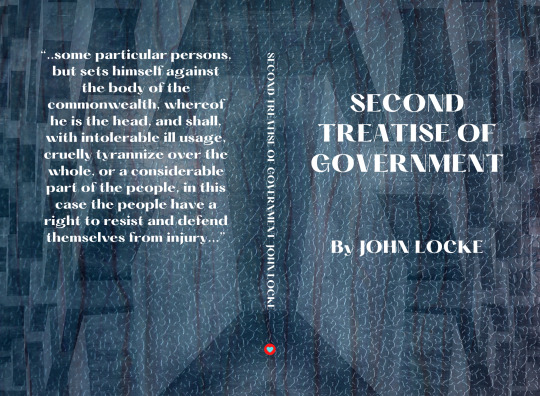
John Locke's "Second Treatise of Government" stands as a cornerstone of modern political philosophy, presenting a compelling argument for the principles of natural rights, social contract theory, and limited government. Written against the backdrop of political upheaval in 17th-century England, Locke's treatise remains as relevant and influential today as it was upon its publication.
At the heart of Locke's work lies the concept of natural rights, wherein he asserts that all individuals are born with inherent rights to life, liberty, and property. Locke argues that these rights are not granted by governments but are instead derived from the natural state of humanity. Through logical reasoning and appeals to natural law, Locke lays the groundwork for the assertion of individual rights as fundamental to the legitimacy of government.
Central to Locke's political theory is the notion of the social contract, wherein individuals voluntarily enter into a political community to secure their rights and promote their common interests. According to Locke, legitimate government arises from the consent of the governed, and its authority is derived from its ability to protect the rights of its citizens. This contract between rulers and the ruled establishes the basis for legitimate political authority and provides a framework for assessing the legitimacy of governmental actions.
Locke's treatise also advocates for the principle of limited government, arguing that the powers of government should be strictly defined and circumscribed to prevent tyranny and abuse of authority. He contends that governments exist to serve the interests of the people and should be subject to checks and balances to prevent the concentration of power in the hands of a few. Locke's advocacy for a separation of powers and the rule of law laid the groundwork for modern democratic governance and constitutionalism.
Moreover, Locke's emphasis on the right to revolution remains a contentious and influential aspect of his political philosophy. He argues that when governments fail to fulfill their obligations to protect the rights of citizens, individuals have the right to resist and overthrow oppressive regimes. This revolutionary doctrine has inspired movements for political reform and self-determination throughout history, serving as a rallying cry for those seeking to challenge unjust authority.
In conclusion, John Locke's "Second Treatise of Government" is a seminal work that continues to shape the discourse on political theory and governance. Through his eloquent prose and rigorous argumentation, Locke presents a compelling vision of a just and legitimate political order grounded in the principles of natural rights, social contract, and limited government. His ideas have left an indelible mark on the development of liberal democracy and remain essential reading for anyone interested in understanding the foundations of modern political thought.
John Locke's "Second Treatise of Government" is available in Amazon in paperback 12.99$ and hardcover 19.99$ editions.
Number of pages: 181
Language: English
Rating: 9/10
Link of the book!
Review By: King's Cat
#Second Treatise of Government#John Locke political theory#Natural rights philosophy#Social contract theory Locke#Limited government principles#Individual liberty Locke#Government legitimacy theory#Consent of the governed#Locke's political philosophy#Locke's theory of government#Locke's political ideas#Locke's philosophy of freedom#Locke's view on governance#Locke's theory of sovereignty#Locke's concept of property rights#Locke's influence on democracy#Enlightenment political thought#Liberal democracy Locke#Civil liberties in Locke's theory#Separation of powers Locke#Rule of law Locke#Right to revolution theory#Constitutionalism Locke#Political reform ideas#Tyranny resistance Locke#Locke's concept of equality#Locke's principles of justice#Government accountability Locke#Freedom of expression Locke#Civic duty in Locke's theory
2 notes
·
View notes
Text
By: James Lindsay
Published: Nov 11, 2023
We are not God. We cannot become God, make God, or speak with the authority of God. This is axiomatic and the beginning of wisdom and prosperity.
Because we are not God, we cannot know the full nature of God, or even for certainty whether God exists at all. As a result, we cannot know any purpose, including ultimate purpose, each of our lives may have. Because we cannot know the full nature of God, should He exist, nor any purpose our lives may have in His sight, we lack the authority to compel the beliefs of others, lest we lead them into ultimate error. In particular, we therefore lack the authority to alienate anyone, self or other, from the possibility of fulfilling that purpose. In short, lacking the authority of God, we lack justification for the compulsion of our fellow man.
In that we all lack the authority of God and thus any justification for the compulsion of our fellow man, all men are created politically equal. Nothing in the world, which is also not God, justifies an intrinsically limited human being to hold political or social authority over another without the consent of both parties to that relationship. Any authority we can hold over any other person must therefore be earned, provisional, temporary, and voluntarily given and accepted.
Men, by their morally limited nature, which is sometimes called “fallen,” often seek to compel the belief, speech, and action of other men, both for good reasons and bad. The primary mechanisms by which a man can successfully compel another man to belief, speech, or action are through credible threats to his life, liberty, and livelihood, generally recognized in the last case as his property. Further, because of the nature of the ultimate privacy of conscience, which men may have any number of good reasons to keep private from other men, undue violation of the privacy of man and the contents of his mind can coerce him. Any who can destroy another’s life, liberty, or livelihood, or sufficiently violate his privacy, can compel his belief, speech, and activity and thus alienate him through destruction or compulsion from any potential ultimate purpose he may have. Only God could possibly hold such authority, and we are not God. No man can justify claiming such authority.
Thus, we hold these truths to be self-evident: that we are not God, and by virtue of that, we have been endowed by that which led to our existence, our Creator, whether the Laws of Nature or Nature’s God, with certain unalienable rights, and that among these are his life, liberty, and property, including the property of the private contents of our minds, and the ability to make use of these to pursue our happiness, fortunes, and whatever purposes, ultimate or otherwise, there may be within and of our lives.
These rights and the privacy necessary to maintain them shall be set aside and therefore, in light of the original meaning of the word, regarded as holy.
Because men must nevertheless live among one another in as much peace and in pursuit of as much prosperity as we may attain, some political system—a just government—needs to be instituted among them not for their rule but for the securing of these holy and unalienable rights. The primary purpose of a just government is therefore to secure these rights and to facilitate the peaceful resolution of conflicts and disputes that arise between men as a result of them and their individual differences.
What must such a government abide by, then, so that it can achieve this sacred task without itself alienating man from that which is unalienable? Government, too, is not God, no matter in what way it is instituted among men. It cannot become God, neither can it make God, nor can it speak or act with the authority of God. It must abide by limitations of nearly every imaginable sort and must secure the inalienable rights of man from itself and others.
Because a government lacks the authority of God, a just government has no intrinsic political authority over the men among whom it is constituted. That is, a just government cannot rule, and it cannot govern except with the consent of those whom it governs. Since government cannot usurp the authority to rule, law must rule in its place, subject to mechanisms of production and amendment that guarantee the participation and consent of those over whom it rules. In that none possesses any special political authority, none can be exempt from the law that is instituted among men for their own just governance.
All governments, including a just government, must possess and wield political authority, however, including to produce and enforce the law, which rules in its stead. That authority in a just government is of the people, by the people, and for the people, and as such it is all loaned political authority ultimately answerable at any time to the people it governs, is provisional, and subject to limits of time, scope, and checks and balances on its power.
A just government must be democratic in nature to obtain the consent of those it governs, but it cannot secure the rights of the few against the many unless the democracy is republican in application. Servants must be consented to by the people they represent. Fair and impartial elections must be held at intervals to loan political authority to public servants and to pass it to others at want or need, or else it usurps an authority greater than itself to which it can claim no right. The greater must be given a say and the lesser must be granted enough representation to counter the tide of opinion held prejudicially or negligently against it.
A just government must secure the rights of speech, press, protest, and petition or it cannot be held to account and the consent with which it governs cannot be duly informed. Its powers must be limited, divided, and placed into a system of checks and balances to prevent it from any illegitimate claim to rule with political authority it cannot have. Government is not God because we are not God. Just governments understand this and keep it. Unjust governments reject this and run afoul of it and the men they are meant to serve.
A just government cannot compel the beliefs, speech, or actions of men because it lacks any such authority, which cannot even be given on loan, and consequently it cannot deprive men of their lives, liberties, or properties, or a reasonable expectation of privacy, without the due process of law pursuant to its solitary sacred objective: to secure the inalienable rights of those whom it serves and protects. It therefore must secure the right to believe, speak, and worship as well as the rights to defend oneself against any and all attempts to alienate men from those fundamental rights which he retains inalienably. It cannot punish cruelly or unusually, torture, or compel any man to profess his own guilt.
Because individual belief and conscience is self-evidently inviolate, just government consequently must also secure a right to privacy without interference in private spaces and a reasonable expectation of limited privacy even in public spaces. In that governments are not God, because we are not God and they are instituted amongst us, they have no authority to violate the inner sanctity of the human mind in any person, neither to torture, nor to surveil persons without justified suspicion or manipulate their beliefs, actions, or environments so as to coerce them against their self-determined will. Instead, as with our other unalienable rights, just governments have a duty to secure a reasonable right to privacy between citizens and hold no right to violate that right themselves. Because we also are not God, none of us individually has any such authority over one another either.
As with just governments, just individuals must obtain any social or political authority they hold over another man by obtaining his consent. Because none possess intrinsic authority over others, consent to hold political authority must not be absolute and should be given freely and under contract according to merits and on terms determined by both relevant parties to be acceptable to each. Political authority between adults is therefore extended by virtue of demonstrated competence that is compelling to those in the relationship. Just governments should secure these arrangements and establish courts of justice to facilitate the resolution of conflicts between parties. The courts must adjudicate the law with impartiality, favoring neither the greater nor the lesser, and only under such judicial restraint should just men submit to the court. Arbitrary power must be resisted, and any doctrine of nonresistance against arbitrary power and oppression is absurd, slavish, and destructive of the good and happiness of mankind. Courts must therefore be impartial in carrying out the law.
Because belief cannot be compelled, likewise, none possess the authority to compel another to believe in any idea, right or wrong, true or false. Therefore, no proposition is to be regarded as true or good by virtue of he who made it. Every proposition earns its authority through processes of validation that demand it survive challenge by competing ideas that ultimately must be brought to bear against our best assessment of the laws of nature of objective reality or of God’s Creation, which by definition cannot be wrong or false and rest outside of but are accessible to each and every man. Men can establish themselves as authorities, to which others can consent or not, based upon their demonstrated capacities to determine that which is right and true through the successful applications of their talents and perceptions. In that every man is not God, which is to say he is limited and finite, no man obtains special or final authority on any of his proclamations of rightness or truth and must consent to seeing his own ideas challenged by those of others.
Because our right to our own property is inalienable, so is our right to do with our property what we will so long as it doesn’t violate the inalienable rights of others. In other words, we have the right not only to hold our property but to engage in commerce with it according to the principles of free enterprise under the law. Property can be exchanged by any two parties who mutually consent to the terms of the contract of exchange without undue interference by third parties, and a just government should secure this right to engage in commerce under its duty to secure the rights of each citizen’s property.
In summary, we are not God. The consequences of this self-evident proposition are vast. None of us possesses the authority to compel another or his belief because we lack in our limitation understanding of the significance of any error against his intrinsic value and potential purpose made in that way. We therefore self-evidently start the project of organizing our society from a position of political equality with certain rights that are inalienable, among these life, liberty, property, capacity for their use toward our happiness and purposes, and a reasonable expectation of privacy in which we can maintain their sanctity. Lacking authority to rule over one another, we are ruled instead by law and merit and lend social and political authority in limited ways as such through processes that are open in their nature and that may best determine these as objectively as we may. Individual belief is sacrosanct not because any man is God but because every man is not. The individual is politically inviolate because he is the vessel of his own sacrosanct individual belief.
Together, these provocative and humbling ideas and the social and political project they define have a name. These are classical liberalism.
#James Lindsay#liberalism#classical liberalism#liberal ethics#liberal values#free speech#freedom of speech#consent of the governed#religion is a mental illness
5 notes
·
View notes
Text
"A Foundation of Modern Political Thought: A Review of John Locke's Second Treatise of Government"
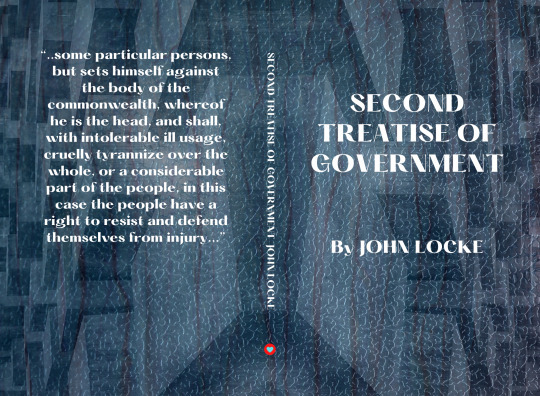
John Locke's "Second Treatise of Government" stands as a cornerstone of modern political philosophy, presenting a compelling argument for the principles of natural rights, social contract theory, and limited government. Written against the backdrop of political upheaval in 17th-century England, Locke's treatise remains as relevant and influential today as it was upon its publication.
At the heart of Locke's work lies the concept of natural rights, wherein he asserts that all individuals are born with inherent rights to life, liberty, and property. Locke argues that these rights are not granted by governments but are instead derived from the natural state of humanity. Through logical reasoning and appeals to natural law, Locke lays the groundwork for the assertion of individual rights as fundamental to the legitimacy of government.
Central to Locke's political theory is the notion of the social contract, wherein individuals voluntarily enter into a political community to secure their rights and promote their common interests. According to Locke, legitimate government arises from the consent of the governed, and its authority is derived from its ability to protect the rights of its citizens. This contract between rulers and the ruled establishes the basis for legitimate political authority and provides a framework for assessing the legitimacy of governmental actions.
Locke's treatise also advocates for the principle of limited government, arguing that the powers of government should be strictly defined and circumscribed to prevent tyranny and abuse of authority. He contends that governments exist to serve the interests of the people and should be subject to checks and balances to prevent the concentration of power in the hands of a few. Locke's advocacy for a separation of powers and the rule of law laid the groundwork for modern democratic governance and constitutionalism.
Moreover, Locke's emphasis on the right to revolution remains a contentious and influential aspect of his political philosophy. He argues that when governments fail to fulfill their obligations to protect the rights of citizens, individuals have the right to resist and overthrow oppressive regimes. This revolutionary doctrine has inspired movements for political reform and self-determination throughout history, serving as a rallying cry for those seeking to challenge unjust authority.
In conclusion, John Locke's "Second Treatise of Government" is a seminal work that continues to shape the discourse on political theory and governance. Through his eloquent prose and rigorous argumentation, Locke presents a compelling vision of a just and legitimate political order grounded in the principles of natural rights, social contract, and limited government. His ideas have left an indelible mark on the development of liberal democracy and remain essential reading for anyone interested in understanding the foundations of modern political thought.
John Locke's "Second Treatise of Government" is available in Amazon in paperback 12.99$ and hardcover 19.99$ editions.
Number of pages: 181
Language: English
Rating: 9/10
Link of the book!
Review By: King's Cat
#Second Treatise of Government#John Locke political theory#Natural rights philosophy#Social contract theory Locke#Limited government principles#Individual liberty Locke#Government legitimacy theory#Consent of the governed#Locke's political philosophy#Locke's theory of government#Locke's political ideas#Locke's philosophy of freedom#Locke's view on governance#Locke's theory of sovereignty#Locke's concept of property rights#Locke's influence on democracy#Enlightenment political thought#Liberal democracy Locke#Civil liberties in Locke's theory#Separation of powers Locke#Rule of law Locke#Right to revolution theory#Constitutionalism Locke#Political reform ideas#Tyranny resistance Locke#Locke's concept of equality#Locke's principles of justice#Government accountability Locke#Freedom of expression Locke#Civic duty in Locke's theory
0 notes
Text
No more kings
0 notes
Text
I always think it's odd that the folks in the US government don't realize that the more they break the social contract, the more the people have the moral high ground to rise up and kill them all.
0 notes
Text
Me before writing this GOT fic: this will mostly be about Sansa, my main squeeze, my best girl and beloved
Me while writing this GOT fic: so instead of the whole dumb shit that happens to Daenerys in seasons 5 & 6 what if instead she’s presiding over Meereen while it invents democracy so it can vote her out of the city. Along the way Meereen invents journalism and soccer.
#they will vote her out with love#but like… Daenerys’s whole relationship with ‘consent of the governed’ is SO WEIRD#and I would love for a story to actually have her walking her talk in re: ‘Meereen (and Yunkai and Astapor) should choose their own leaders#also lbr we all deserve some Game Of Thrones 1776 nonsense in our lives#starring Daenerys as BOTH John Hancock and King George#maybe a little of G Washington too#anyway this outline is already 130 pages#pray 4 me#game of thrones motherfuckers
307 notes
·
View notes
Video
Social Security and Medicare and debt
Manufacturing consent
#tiktok#Manufacturing Consent#Social Security#Medicare#privatisation#medicare for all#public education#debt#us government#government#government and politics#defunding#defund#profits
905 notes
·
View notes
Text
Remember when Trump said "we're only in syria for the oil" good thing thats changed - now the Biden administration doesn’t say that out loud in public! [10 Feb 24]
#so rude to attack an oil field operated with the consent of the internationally recognized government of the country#that goes against the international rules based order#wait what do you mean
75 notes
·
View notes
Text
TIL that the majority of France didn't speak French by the time of the French Revolution, and neither did a significant amount of people until the turn of the 20th century, despite the government's desperate attempts at nation-building since Napoleon. The French they did speak had dialects so diverse that the language could be mutually unintelligible between regions. This while French was used as Europe's lingua franca, especially as the language of diplomacy between empires as far flung as the Ottomans.
Really brings home how fucking recent, artificial and an inherently colonizing force the concept of a nation is. It's literally barely glued together with military coercion and propaganda.
#anarchism#french history#european history#nationalism#'consent of the governed' covers a multitude of sins#colonization#decolonization#knee of huss
26 notes
·
View notes
Text
I hope all of the Republicans, always blowing smoke up everyone's ass about how it's their "right" to do something, understand that it's a violation of the first amendment to take away reproductive rights.
I am a wiccan, and my reed doesn't tell me I can't have an abortion. Our Supreme Court is filled with a bunch of fucking conservative Catholics (not all but a concerning amount) who are biased and influenced when reviewing the constitution and other such laws. We're going against what our country was built on.
#I don't consent to be governed#not like this#we the people#american politics#important lore#reproductive rights#religious freedom#religious tolerance#us politics#usa news#supreme court#roe v wade
96 notes
·
View notes
Text

reblog to gently feed him a cheese puff out of the palm of your hand
#scribbles#bungou stray dogs#bsd#goncharov bsd#ivan goncharov bsd#ivan bsd#ivan goncharov#blood#head trauma#gore#hes my fav minor character of choice#i love characters who have fucked up brains. the dominus fan says#i have a highly specific vision of after the cannibalism arc goncharov is taken to some government ability hospital-prison#because i think something a lot of ppl miss with him - or rather what compels me to him - is his mental vulnerability and lack of autonomy#whatever fyodor did to his brain? FUCKED UP!! i honestly just feel Bad for goncharov more than anything else#im rly not a fan of the whole shippingbrained take that hes just another like. villain yaoi guy you can ship with fyodor#when his circumstances of like. all things considered being completely unable to think properly much less consent#make him waay more dubious to ship with than like. idk shibusawa or whoever#i love goncharov tho hes really intriguing. ik he just kinda exists for shock value and a fight scene and making fyodor scarier#BUT i like him:] and people have been obsessed with characters for less so i get him#he gets a pov scene in a fic im writing with my friend dark and im excited to get to share that
53 notes
·
View notes
Text
BABIES SHOULD NOT BE FUCKING.
BABIES SHOULD NOT BE FUCKING.
BABIES SHOULD NOT BE FUCKING.
BABIES SHOULD NOT BE FUCKING.
BABIES SHOULD NOT BE FUCKING.
BABIES SHOULD NOT BE FUCKING.
BABIES SHOULD NOT BE FUCKING.
BABIES SHOULD NOT BE FUCKING.
BABIES SHOULD NOT BE FUCKING.
BABIES SHOULD NOT BE FUCKING‼️‼️
#anti map#anti proshitter#anti proship#tw sexualization of minors#tw cp mention#tw csem#csem tw#anti romeo and juliet laws#the age of consent is 18#no exceptions#repetition#pocd#intrusive thoughts tw#intrusive thoughts#actually pocd#protect minors#anti america#fuck america#fuck the usa#fuck the us government#romeo and juliet laws
30 notes
·
View notes
Text


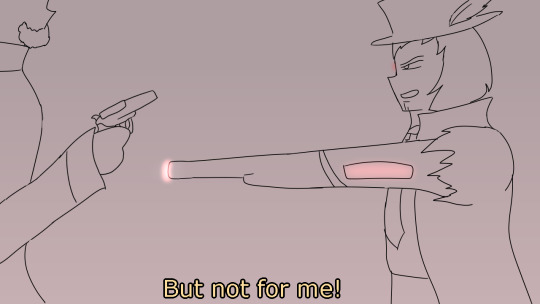
Wolf can use his cybernetics to create a visual hologram that can look and sound like another person (as long as he has scanned the person ahead of time) which can come in handy when infiltrating events or luring an enemy out into the open, though it does take alot out of him afterwards.
#doodle#meme#comic#wolf dirklaser#thsc oc#dressing the part kinda helps keep the energy cost of keeping the facade slightly lower#also wolf doesnt scan his fellow toppats at random as he only does it with consent and it being for a mission#random corrupt people and government scum however are different#*rolls back into the void*
21 notes
·
View notes
Text
one of my least favorite themes about the internet lately is non-american people complaining that americans are talking about american-centric issues on the internet and being like "nOt EvErYtHiNg ReVoLvEs ArOuNd YoU iDiOtS" and it's like. yeah buddy. that's why we didn't apply it to anywhere else in the world. we're talking about the specific issues we are facing as americans living in the states. the reading comprehension is atrocious
#like idk how to tell you that not every american you interact with is gonna be living a rich life in a mega mansion free from strife#the vast majority of us are living under a religious rule disguised as democracy with our own police force killing us in droves every day#your biased view of the states as this place with no pain and suffering is harmful and people are dying in our streets#and its always from these people who think they're communists who care about the collective good and i just. man. i don't understand#i don't understand the disconnect. we're a part of this conversation too the real issues we face are getting real people killed#especially when its coming from leftist non-americans to leftists americans. its like#you KNOW i don't support my country why are you berating me for talking about the real problems we're facing?#individual leftist americans don't make the policies that are killing other countries and i think those conversations are allowed to be two#separate entities without people screaming at us for talking about the atrocities we're facing just bc our government that we have lost#control of is doing things we do not consent or agree to#like fuck dude. americans are still PEOPLE#we are still SUFFERING#and to be clear this isn't to take away from suffering from anyone else this is specifically about when someone from the states complains#about something happening IN THE STATES and non-americans butt in to make a comment about it not being all about us like#baby WHAT#anyways whatever i'm tired i'm going to bed
3 notes
·
View notes
Text
ANCAPS ARENT ANARCHISTS! DORK ASS BOOT-LICKING LOSERS!

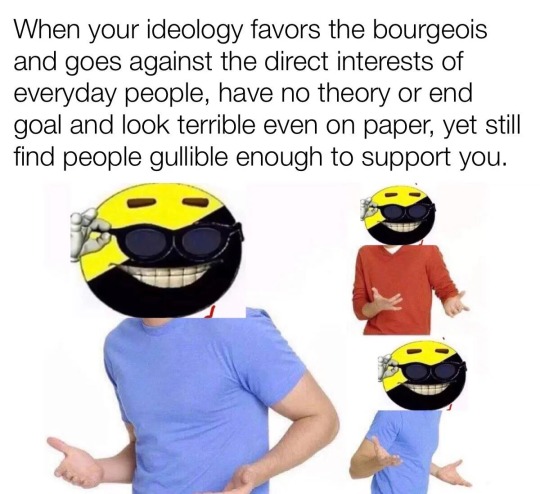
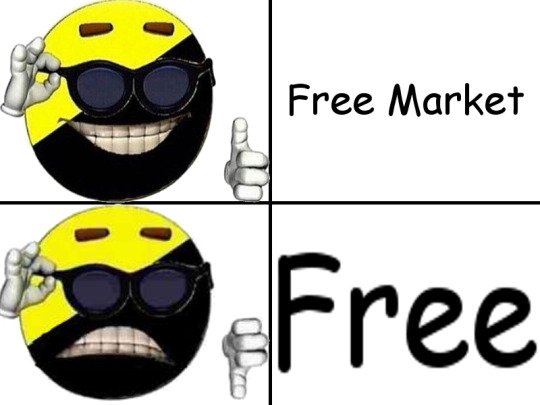
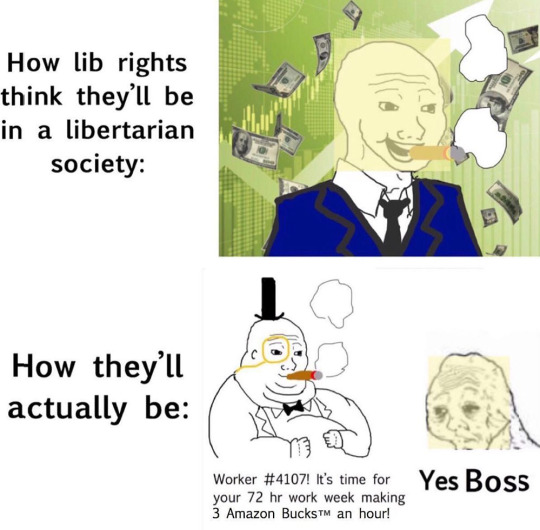
#ancap#libertarian#since they only understand theory presented as rage comics#every time some ancap moron rbs one of my government bad posts cause their ‘gov bad’ take is cause the age of consent is too high
10 notes
·
View notes